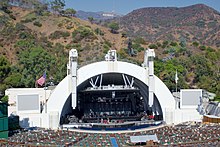amphitheatre
Appearance
See also: amphitheater and amphithéâtre
English
[edit]


Etymology
[edit]From Latin amphitheatrum, from Ancient Greek ἀμφιθέατρον (amphithéatron) from ἀμφί (amphí, “on both sides”) + θέᾱτρον (théātron, “theatre”).
Pronunciation
[edit]- (Received Pronunciation) IPA(key): /ˈæmfɪˌθiːətə/, /ˈæmfɪˌθɪətə/, /ˈæmfiˌθiːətə/
- (General American) IPA(key): /ˈæm.pəˌθi.(j)ə.tɚ/, /ˈæm.fəˌθi.(j)ə.tɚ/[1][2]
Audio (UK): (file) Audio (US): (file)
Noun
[edit]amphitheatre (plural amphitheatres)
- An open, outdoor theatre (which may be a theatre in the round, or have a stage with seating on only one side), especially one from the classical period of ancient Greece or Rome, or a modern venue of similar design.
- Ancient Roman amphitheatres were mostly oval or circular in plan, with seating tiers that surrounded the central performance area, like a modern open-air stadium.
- 1816, John Cam Hobhouse Baron Broughton, The Substance of Some Letters, page 192:
- We had previously visited the building prepared for the assemblage, which was a vast pentagonal semicircular amphitheatre of painted wood and canvas work, ...
- 1994, J. A. B. Somerset, Shropshire, University of Toronto Press, →ISBN, page 388:
- The dry quarry in Shrewsbury [was] in use from at least 1445-6 [...until] 1568-9 (and perhaps beyond)[. ...] Location of this as the site of a semicircular amphitheatre [used in the 1400s and 1500s] is confirmed by the evidence, published in total for the first time in the present volume.
- (geology) A natural formation of a similar shape, where a steep mountain or slope a particular rock formation forms a partial or compete bowl, especially one used as a performance space (and possibly modified by carving out seats, etc) because the slopes naturally amplify or echo sound.
- 1902, Charles Oman, A History of the Peninsular War, page 188:
- The difference between the approach to Baylen from the west and from the east, is that on the former side the traveller reaches the town through a semicircular amphitheatre of upland, while by the latter he comes up a V-shaped valley ...
- 1939 September, A. F. N. Barnsdale, “The Neath & Brecon Railway”, in Railway Magazine, page 188:
- Brecon or Aberhonddu, a typical Welsh town of 5,350 inhabitants, stands in a grand amphitheatre of hills and mountains at the confluence of the rivers Usk, Honddu, and Tarell.
Alternative forms
[edit]Derived terms
[edit]Translations
[edit]an open, outdoor theatre
|
Further reading
[edit] amphitheatre on Wikipedia.Wikipedia
amphitheatre on Wikipedia.Wikipedia
- ^ “amphitheatre”, in Merriam-Webster Online Dictionary, Springfield, Mass.: Merriam-Webster, 1996–present.
- ^ Paul Brians, Common Errors in English Usage (2008): "AMPITHEATER/AMPHITHEATER The classy way to pronounce the first syllable of this word is "amf," but if you choose the more popular "amp" remember that you still have to include the H after the P when spelling it."
Anagrams
[edit]Categories:
- English terms derived from Proto-Indo-European
- English terms derived from the Proto-Indo-European root *h₂en-
- English terms derived from the Proto-Indo-European root *-trom
- English terms borrowed from Latin
- English terms derived from Latin
- English terms derived from Ancient Greek
- English 5-syllable words
- English 4-syllable words
- English terms with IPA pronunciation
- English terms with audio pronunciation
- English lemmas
- English nouns
- English countable nouns
- English terms with usage examples
- English terms with quotations
- en:Geology
- en:Buildings
- en:Theater
